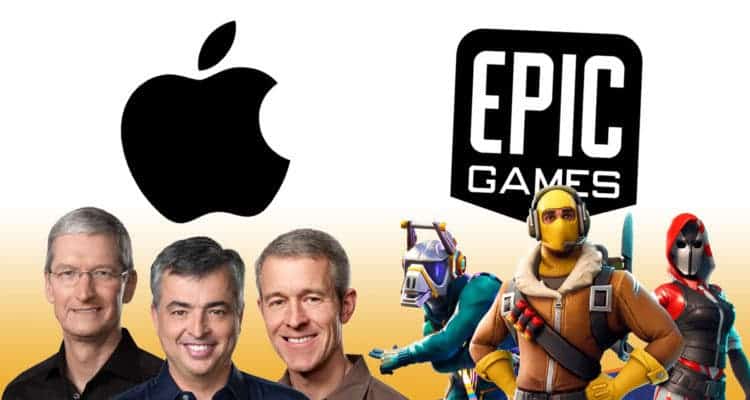Today, Apple reversed its previous decision and restored Epic Games’ developer account in the EU. Apple said in a statement to MacRumors that Epic Games is committed to abiding by the rules and allowing the Epic Swedish developer account to rejoin the Apple Developer Program.
The company wrote in a statement:
After speaking with Epic, they committed to following the rules, including our DMA policy. As a result, Epic Sweden AB has been approved to re-sign the Developer Agreement and join the Apple Developer Program.
Apple terminated Epic Games’ Swedish developer account earlier this week. This effectively prevents Epic Games from developing third-party apps for iPhone users in the EU. The company claimed that it terminated the account because of Epic Games’ previous breach of contractual obligations and that the court’s ruling in the legal action Epic Games v. Apple gave Apple the right to close any Epic Games account at any time.

In an attempt to defend its decision, Apple said
Epic’s material breach of its contractual obligations to Apple resulted in the court ruling that Apple has the right to terminate its developer accounts “at any time and in its sole discretion,” including any or all of Epic Games’ wholly owned subsidiaries, affiliates, and other entities under Epic Games’ control. . Apple chose to exercise this right given Epic’s past and current conduct.
However, Epic Games swiftly replied saying
By terminating Epic’s developer account, Apple is clearing out one of its biggest potential competitors in the Apple App Store. They are undermining our ability to be a viable competitor. They are “flexing their muscles” to other developers, showing that this is what will happen if anyone tries to compete with Apple or criticizes Apple’s unfair practices.
EU intervenes
According to the British “Financial Times” report, the European Commission has asked Apple to provide “further explanation” for its decision to terminate the Epic Games developer account. The European Commission said it is probing this under the Digital Markets Act (DMA). The DMA is a new law aimed at limiting the power of large online platforms, and tech companies have until March 7 to comply. Apple said a court had previously granted it the right to terminate the accounts of any of Epic’s subsidiaries due to contractual violations.
The move thwarts Epic’s plans to launch the Epic Games Store in the EU and bring Fortnite back to the iPhone. As part of complying with the DMA, starting with iOS 17.4, Apple is allowing additional app stores to be used on iPhones in the EU. Epic argued that Apple’s termination of its account violated the DMA and severely limited competition on iOS devices.

Epic denounced Apple’s decision as a violation of competition principles, arguing it was evidence of Apple’s unwillingness to allow legitimate competition on its platform. The company claimed that Apple’s move was intended to eliminate a major potential competitor in the App Store. Apple’s move is the latest development in a larger legal conflict between the two parties since 2020. At that time, Apple removed its game “Fortnite” from the App Store because Epic bypassed Apple’s payment system rules. In response, Epic filed lawsuits in the United States and Australia accusing Apple of anti-competitive conduct.
Reason for Apple’s decision to block Epic
Apple’s Phil Schiller spoke with Epic Games CEO Tim Sweeney. He asked Sweeney for written assurance that Epic Games will comply with the new rules of the third-party app market. However, Apple felt Sweeney’s response wasn’t thorough enough. For this reason, the company effected the ban
Schiller said via email
Epic has broken contracts in the past. For example, Epic joined the Developer Program with full understanding of its terms, and then chose to knowingly violate its agreement with Apple.
Epic knowingly violated Apple’s rules to achieve a purpose and get financial gain. Recently, you described our DMA compliance program as “hot garbage,” a “horror show,” and a “cunning new example of malicious compliance.” You also complain about the so-called “garbage fee” and the “Apple tax.”
Epic’s Response
The European Union quickly intervened and asked Apple to “further explain” why it closed the EU Epic Games developer account. This move made Apple quickly reconsider its decision. Epic Games said in a statement to MacRumors that Apple’s response indicates that the European Commission plans to move quickly to enforce the DMA and that the Epic Games Store is coming to Europe.
Apple has informed us and promised the European Commission that they will reinstate our developer accounts. This sends a strong signal to developers that the European Commission will act quickly to enforce the Digital Markets Act and hold gatekeepers accountable. We will proceed with the launch of the Epic Games Store as planned and return “Fortnite” to the European iOS platform.

Conclusion
In conclusion, the recent developments between Apple and Epic Games underscore the complexities of competition within the digital marketplace, particularly in the realm of app distribution and platform governance. Apple’s decision to initially terminate Epic’s developer account in the EU reflects the ongoing tensions between tech giants and developers seeking to challenge established norms and practices.
The intervention of the European Commission under the Digital Markets Act (DMA) highlights the regulatory scrutiny facing dominant online platforms and their actions regarding competition and consumer choice. The Commission’s request for further explanation from Apple signals a proactive approach to enforcing regulations aimed at fostering fair competition and innovation in the digital ecosystem.
Epic Games’ swift response and the subsequent reinstatement of its developer accounts by Apple underscore the significance of regulatory oversight in shaping industry dynamics and protecting the interests of consumers and developers alike. The resolution of this dispute reflects the growing influence of regulatory frameworks in addressing antitrust concerns and promoting a level playing field in the digital marketplace.
As Apple and Epic Games navigate the complexities of regulatory compliance and market competition, their interactions serve as a microcosm of broader debates surrounding the power dynamics between platform operators, developers, and regulatory authorities. The outcome of this dispute sets a precedent for future engagements between technology companies and regulatory bodies, emphasizing the importance of transparency, accountability, and adherence to regulatory standards in fostering a fair and competitive digital economy.





